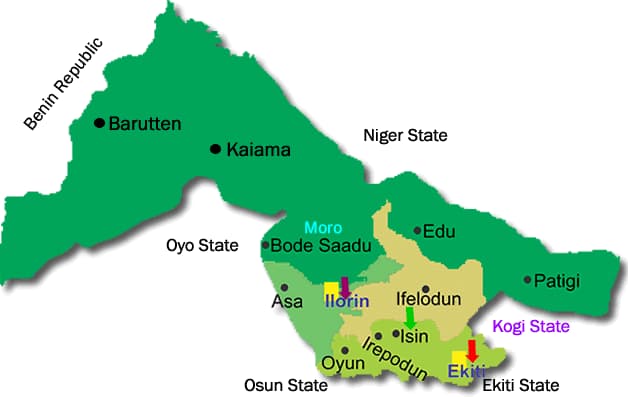A devastating incident occurred in the Edun area of Ilorin West Local Government Area, Kwara State, where a 43-year-old man named Kareem lost his life after jumping into a domestic well. According to reports, Kareem had consumed a synthetic cannabinoid, locally referred to as “Colorado,” which is known for its potent and often dangerous psychoactive effects. The tragedy unfolded shortly after he returned from observing Eid-el-Kabir prayers, a significant religious event in the Muslim community, highlighting the abrupt and sorrowful nature of the event.
The Kwara State Fire Service was alerted to the incident at approximately 10:29 a.m. following a distress call from residents in the Edun community. Firefighters promptly arrived at the scene and successfully recovered Kareem’s body from the well, though he was already deceased. The body was subsequently handed over to Inspector Babatunde Amos of the ‘C’ Division Police Station in Ilorin for further investigation and procedural handling, as is standard in such cases.
Falade Olumuyiwa, the Director of the Kwara State Fire Service, expressed deep sorrow over the incident, emphasizing the preventable nature of the tragedy. He urged the public to steer clear of drug abuse, noting that substances like Colorado can lead to severe behavioral changes, impaired judgment, and, in this case, fatal consequences. Olumuyiwa’s statement underscored the broader societal issue of drug misuse, which continues to claim lives and disrupt communities across Nigeria.
The synthetic cannabinoid known as Colorado has gained notoriety in recent years for its accessibility and devastating effects, particularly among young and middle-aged individuals. Unlike traditional cannabis, Colorado is often laced with unpredictable chemicals that can induce extreme agitation, hallucinations, and suicidal behavior, as may have been the case with Kareem. Local authorities have repeatedly warned against its use, but its prevalence in certain communities remains a significant public health challenge.
Efforts to contact the Kwara State Police Command spokesperson, DSP Ejire-Adeyemi Toun, for additional details on the incident were unsuccessful at the time of reporting. This lack of immediate police commentary left some questions unanswered, such as whether Kareem had a history of drug use or if there were witnesses to his actions prior to the incident. Nonetheless, the police are expected to conduct a thorough investigation to ascertain the full circumstances surrounding the tragedy.
The Edun community, a residential area in Ilorin, was left in shock following the incident, with neighbors and onlookers grappling with the sudden loss of a community member. Such events often prompt discussions about mental health, substance abuse, and the need for stronger community-based interventions to address these issues. Residents expressed hope that Kareem’s death would serve as a wake-up call for others engaging in or considering drug use.
The Kwara State Fire Service’s swift response was commended by local authorities, as their expertise in rescue operations ensured that the body was retrieved efficiently, allowing for proper handling and closure for the family. However, the incident also highlighted the limitations of emergency services in preventing such tragedies, as the root cause—drug abuse—requires broader societal and governmental action. Community leaders have called for increased awareness campaigns and rehabilitation programs to tackle the growing drug problem in the state.
Kareem’s death adds to a troubling trend of drug-related incidents in Nigeria, where synthetic drugs like Colorado have become increasingly prevalent in urban and semi-urban areas. Public health experts have long advocated for stricter regulations on the sale and distribution of such substances, as well as improved access to addiction treatment services. Without significant intervention, similar tragedies are likely to recur, leaving families and communities to bear the emotional and social toll.
The incident also raises questions about the role of religious and cultural events, such as Eid-el-Kabir, in providing community support systems that could potentially identify and assist individuals struggling with substance abuse. While Kareem had participated in the communal prayers, it remains unclear whether he exhibited any visible signs of distress that could have prompted intervention. This aspect of the tragedy underscores the need for greater vigilance and support within communities during such gatherings.
As investigations continue, Kareem’s family is left to mourn the loss of a loved one under heartbreaking circumstances. The Kwara State government has yet to issue an official statement on the incident, but there is growing pressure for authorities to address the underlying issues of drug abuse and mental health. Community advocates are pushing for collaborative efforts between government agencies, religious institutions, and non-governmental organizations to create a comprehensive strategy to combat the drug crisis.
In his closing remarks, Fire Service Director Olumuyiwa reiterated the importance of collective responsibility in preventing such incidents. He called on parents, educators, and community leaders to educate young people about the dangers of drug use and to foster environments where individuals feel supported in seeking help. His message resonated with many in Ilorin, who see the incident as a somber reminder of the urgent need for action.
The tragedy in Edun serves as a stark warning about the perils of synthetic drugs and the devastating impact they can have on individuals and their communities. As Ilorin mourns Kareem, there is a renewed sense of urgency to address the systemic factors contributing to drug abuse in Kwara State and beyond. Whether this incident will spur meaningful change remains to be seen, but for now, it stands as a poignant call for awareness, prevention, and compassion.




